----------------------
"Staff Writer" seems to believe that Natives should think, talk, and act like European/Western whites. Or at least this is the implication. The fact that a Native Christian pastor would write a translation of the Bible that speaks to Native ways of understanding, uses Native concepts and language, and communicates ideas in the way that Natives understand and think, well, that's just beyond the pale.
And that's the crux of the issue. "Staff Writer" doesn't like Indian phraseology or Indian concepts. He thinks that accuracy must mean a highly literal translation of each word; more specifically, a literal translation in the exact same way these words have been translated in the past.
Ironically, the culture and ways of understanding of the ancient Jews don't always translate to our western culture. We undertake to educate ourselves in order to understand these expressions and ways of thinking, then make our best attempt to integrate them into our cultural context. That is, we have for centuries been doing the same thing "Staff Writer" is accusing Pastor Wildman of doing: Conforming the text to our culture.
Unfortunately, "Staff Writer" doesn't want Natives to possess this privilege. They are not allowed to take Jewish concepts and adapt them to their culture. They have to do it the way white men do it.
-----------------------
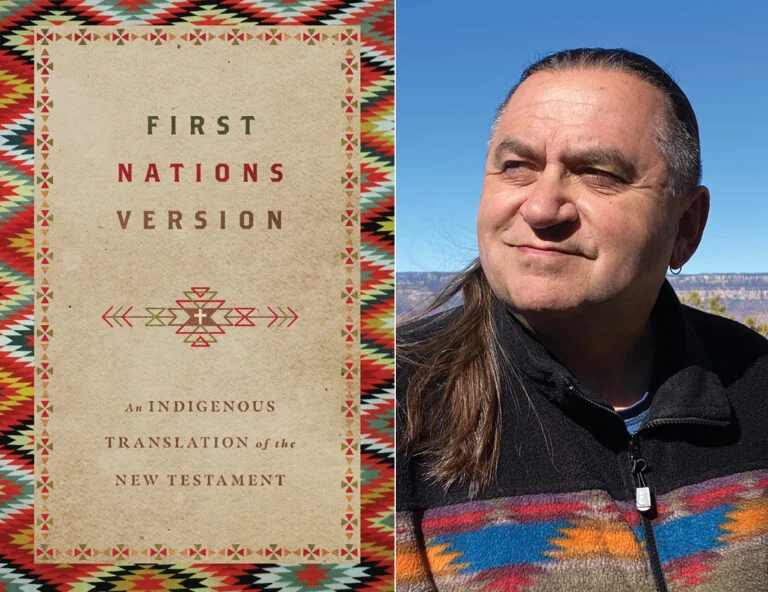
A new Bible translation has been released, the ‘First Nations Version’ (FNV) and right away one thing is clear: this is an absolute trainwreck of a translation. This is because the FNV is not a word-for-word translation; rather, it is a thought-for-thought translation/ dynamic equivalent translation, (It's a "trainwreck" because it's not word-for-word? What requirement is there for a translation to be word-for-word?)

A new Bible translation has been released, the ‘First Nations Version’ (FNV) and right away one thing is clear: this is an absolute trainwreck of a translation. This is because the FNV is not a word-for-word translation; rather, it is a thought-for-thought translation/ dynamic equivalent translation, (It's a "trainwreck" because it's not word-for-word? What requirement is there for a translation to be word-for-word?)
which means it’s nothing more than a paraphrase, and not a particularly good one at that. (We hope "Staff Writer" will demonstrate. Hint: He won't.)
It’s another entry into the long line of GistBibles. I.e it’s more or less the gist of what the scriptures say. For this reason, it cannot be considered a translation in any way, shape or form. ("Staff Writer" previously described it as a thought-for-thought translation. But now it's not a translation "in any way, shape, or form." So, which is it, sir?)
Released in the last few days, it’s selling too, either topping or being near the top of the charts for a few different categories on Amazon.
#1 in New Testament
#2 in New Testament Meditations
#6 in Native American Studies (Books)
#10 in Bible Meditations
#52 in Textbooks
Much like Eugene Peterson’s ‘The Message bible or the weird Bethel Passion Bible, the FNV was crafted by one man, Terry M. Wildman. ("Staff Writer" first claims this is a solo effort, but two paragraphs from here he will concede it was not a solo effort. Yet again the author contradicts himself.)
Released in the last few days, it’s selling too, either topping or being near the top of the charts for a few different categories on Amazon.
#1 in New Testament
#2 in New Testament Meditations
#6 in Native American Studies (Books)
#10 in Bible Meditations
#52 in Textbooks
Much like Eugene Peterson’s ‘The Message bible or the weird Bethel Passion Bible, the FNV was crafted by one man, Terry M. Wildman. ("Staff Writer" first claims this is a solo effort, but two paragraphs from here he will concede it was not a solo effort. Yet again the author contradicts himself.)
Wildman is ordained as a United Methodist pastor, is of Ojibwe and Yaqui heritage, and for years he pastored the Northport Indian United Methodist Church in Michigan. (Now the author will commence to Poison the Well, preferring to attack Wildman's denomination.)
That church is a UMC congregation, and we’ve written about that thoroughly apostate denomination and their shenanigans here- United Methodist Drag Queen Gets Star Treatment from Denomination’s Official News Service, and here- United Methodist Church Conservatives Forming New Denomination Amid Schism. ("Staff Writer" persists in lambasting the denomination, which we suppose allows him to sidestep discussing what Wildman might believe.)
Wildman likewise (sic) has spent 20 years leading lead Rain Ministries, being one part of a ‘RainSong” duo that provides music and storytelling at Powwows, First Nations gatherings, churches and conferences. Along with being the director of the new paraphrase, he recently took on the role of Director of Spiritual Growth and Leadership Development for Native InterVarsity.
Not to say that he didn’t have some help with the translation.
Wildman likewise (sic) has spent 20 years leading lead Rain Ministries, being one part of a ‘RainSong” duo that provides music and storytelling at Powwows, First Nations gatherings, churches and conferences. Along with being the director of the new paraphrase, he recently took on the role of Director of Spiritual Growth and Leadership Development for Native InterVarsity.
Not to say that he didn’t have some help with the translation.
“Besides the members of our council, many other First Nations people have had input into this translation as reviewers, cultural consultants, and community feedback participants. All in all, the tribal heritages represented include, but are not limited to, Apache, Assiniboine, Blackfeet, Cherokee, Choctaw, Creek, Desert Cahuilla, Cayuga, Diné (Navajo), Hopi, Kalispel, Kiowa, Klickitat, Lakota, Mohawk, Métis, Miami, Muscogee, Nez Perce, Northern Cree, Odawa, Ojibwe, Pawnee, Plains Cree, Potawatomi, Tlingit, Tohono O’odham, Western Cree, Yankton Sioux, Spokane, Wascoe, Yakama, and Yaqui. One council member said, “This sounds so Native that some people won’t believe it’s the Bible.” (So the paraphrase is written by a Native, with the help of numerous other natives, for natives in a manner that speaks to native culture and ways of expression. And the problem is???)The book itself is in English but filled with American Indian religious language, jargon, and terminology. This is concerning, as he frequently takes all the words and phrases that might be used in indigenous religious ceremonies, and then does one-for-one exchanges of expressions that have a built-in, loaded meaning and connotation. (Yes, of course. But "Staff Writer" never gets around to explaining why this is bad. Nor does he point out any discrepancies between the way a white man would chose or understand words vs. a Native man, or even how that might violate the way a Jewish man like Paul would have understood or chosen words as he wrote the NT.)
Wildman explains why he chose to have it in English rather than in a different language.
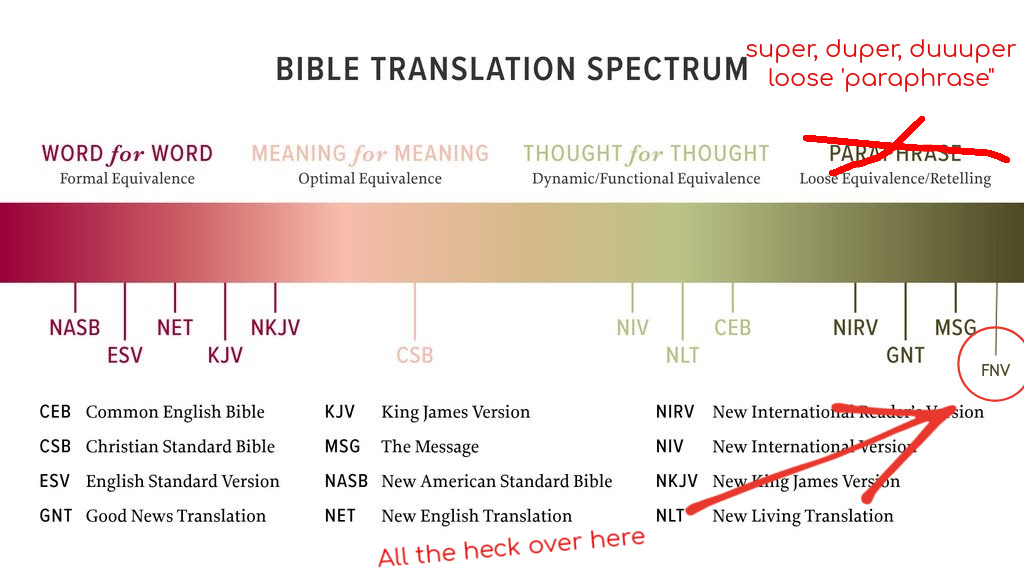
He goes on to explain that along with ‘prayers’ being referred to as “sending his voice to the Great Spirit,” they kept the same name for God that American Indians use within their own non-Christian beliefs, calling him “the Creator and Great Spirit.” (Um, yeah, no. He is indeed the Creator and the Great Spirit. Using this language does no violence at all to the text, or to the Gospel message.)
Because there are so many Marys in the New Testament, they didn’t want to use the name, but rather tweaked it to designate which Mary is being spoken about. Jesus’ Mother became “Bitter Tears”, Mary Magdalene becomes “Strong Tears” and Mary the sister of Martha becomes “Healing Tears.” Wildman told Christian Post:

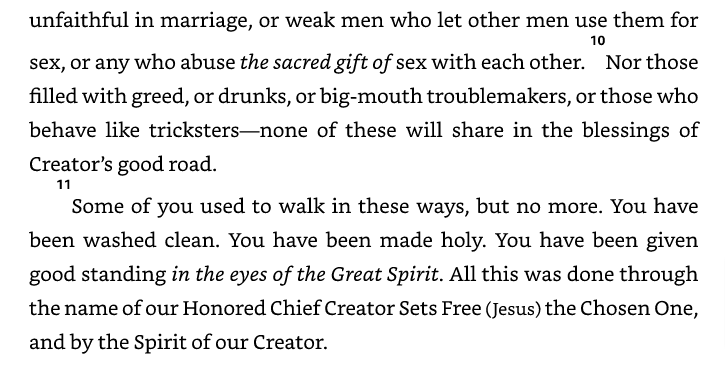
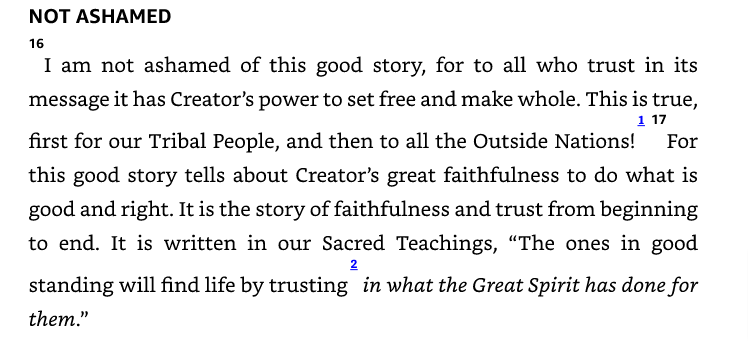
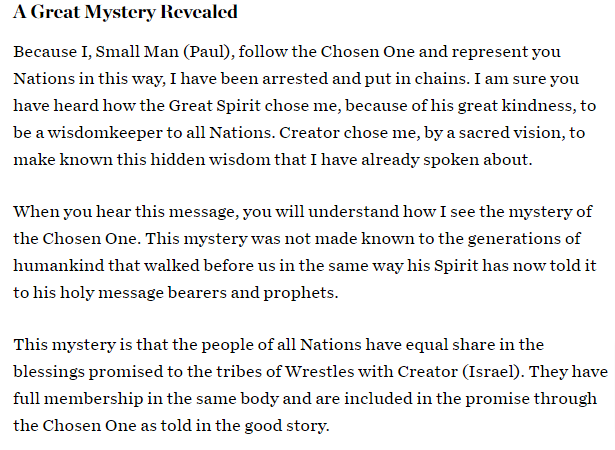
Ultimately the First Nation Version catechizes using foreign concepts that are not biblical and which Jesus never intended to say. (Apparently "Staff Writer" knows Jesus' intent.)
Bonus Bibley thoughts.
The reality is that people oftentimes don’t choose a Bible to know with precision what God actually said, ("Staff Writer" presumes this to be the highest virtue for Bible students, but never demonstrates it.)
Its also because of the modernized language that avoids theological terms that have a rich depth to them, like justification and sanctification. “Justification” has become “asking Jesus into your heart” and “Sanctification” has become “Making better choice through life principles”. (Theological terms only have a "rich depth" if people understand them. Otherwise, Christians are speaking code to each other. But if such phraseology is archaic, then other expressions, if they adequately represent the concept, are perfectly acceptable.
So let’s call it for what it is- a sad testament to our modern-day churchy evangelical culture that values manipulation of the text for personal gratification, over fidelity to the text for corporate sanctification. (Another false binary choice. There are other alternatives.)
Ninety-five percent of Native people don’t speak their language. Of the ones who do, very few can actually read it. This is because of missionary efforts: While they were translating the Bible into our Native languages, they were also taking these languages away from us.He elaborates on some of the distinctives in an interview with the CICW.
We also used words and concepts more relevant to a traditional Native worldview. “Temple” became “Sacred Lodge”; “sin” became “bad hearts” or “broken ways,” depending on the context. “Angel” became “spirit-messenger,” “apostle” became “message bearer,” Jesus becomes “Creator Sets Free” and “Christ” became “Chosen One.” These are only a few examples of our attempt to connect to the traditional way Natives first spoke in English. More than one Native elder has said, “You translate it into English the way we think it in our language.” A young Canadian Native told us that reading the FNV sounded like his grandpa telling stories at the breakfast table…
We translated the word for “church” as “Sacred Family” because of the more relational picture it paints of the body of Christ, which is very culturally important to Native peoples. We changed “bread” to “frybread” in a few places where it seemed appropriate. It took a while to settle on how to translate “kingdom of God” because of the EuroAmerican connotations of king and kingdom. The book Spirit and Resistance by American Indian theologian George E. Tinker helped us settle on translating “kingdom of God” as “Creator’s Good Road.”

He goes on to explain that along with ‘prayers’ being referred to as “sending his voice to the Great Spirit,” they kept the same name for God that American Indians use within their own non-Christian beliefs, calling him “the Creator and Great Spirit.” (Um, yeah, no. He is indeed the Creator and the Great Spirit. Using this language does no violence at all to the text, or to the Gospel message.)
Because there are so many Marys in the New Testament, they didn’t want to use the name, but rather tweaked it to designate which Mary is being spoken about. Jesus’ Mother became “Bitter Tears”, Mary Magdalene becomes “Strong Tears” and Mary the sister of Martha becomes “Healing Tears.” Wildman told Christian Post:
“We believe it’s very important that the Gospel be kind of decolonized and told in a Native way, but being accurate to the meaning of the original language and understanding that it’s a different culture,”As far as what it sounds like, here is a sampling:
“The Great Spirit loves this world of human beings so deeply he gave us his Son – the only Son who fully represents him. All who trust in him and his way will not come to a bad end, but will have the life of the world to come that never fades away, full of beauty and harmony. Creator did not send his Son to decide against the people of this world, but to set them free from the worthless ways of the world.” John 3:16-17Let’s look at 1 Corinthians 6: 9-11 in the ESV.
“Or do you not know that the unrighteous will not inherit the kingdom of God? Do not be deceived: neither the sexually immoral, nor idolaters, nor adulterers, nor men who practice homosexuality, nor thieves, nor the greedy, nor drunkards, nor revilers, nor swindlers will inherit the kingdom of God. And such were some of you. But you were washed, you were sanctified, you were justified in the name of the Lord Jesus Christ and by the Spirit of our God.’
Notice no condemnation of homosexuality:


Romans 1:16-17. ESV “For I am not ashamed of the gospel, for it is the power of God for salvation to everyone who believes, to the Jew first and also to the Greek. For in it the righteousness of God is revealed from faith for faith as it is written, “The righteous shall live by faith.”

Ephesians 3:1-6. ESV “For this reason I, Paul, a prisoner of Christ Jesus on behalf of you Gentiles— assuming that you have heard of the stewardship of God’s grace that was given to me for you, how the mystery was made known to me by revelation, as I have written briefly. When you read this, you can perceive my insight into the mystery of Christ, which was not made known to the sons of men in other generations as it has now been revealed to his holy apostles and prophets by the Spirit. This mystery is that the Gentiles are fellow heirs, members of the same body, and partakers of the promise in Christ Jesus through the gospel.”

Ultimately the First Nation Version catechizes using foreign concepts that are not biblical and which Jesus never intended to say. (Apparently "Staff Writer" knows Jesus' intent.)
He frequently leaves out half the things the Holy Spirit meant to include, and includes half the things that never should have been there. ("Half the things?" Really? Exaggeration is the handy tool of the lazy. We have read the excerpts provided, and find a certain elegance in their expression.
The only things that actually getting left out are "Staff Writer's" preferences regarding which words should be used, and the only things that are getting added are descriptive phrases that in no way dilute the Gospel message.)
This is not a bible translation and would be catastrophically flawed if viewed as such.
Bonus Bibley thoughts.
The reality is that people oftentimes don’t choose a Bible to know with precision what God actually said, ("Staff Writer" presumes this to be the highest virtue for Bible students, but never demonstrates it.)
but rather they choose it and use it for how it makes them feel when they read it. (False binary choice. There are other alternatives.)
You see this all the time in pulpits. Pastors will throw up some notes on PowerPoint and they’ll have 5 different translations/paraphrases? Why use paraphrases like the Message Bible or the FNV? Because it words things in a way that the pastor finds compelling and gripping and in which he thinks the congregation will get a kick out of, picking and choosing his pretexts. ("Staff Writer" presumes this to be bad, but never tells us why we should not be exposed to other ways of expressing ideas.)
Its also because of the modernized language that avoids theological terms that have a rich depth to them, like justification and sanctification. “Justification” has become “asking Jesus into your heart” and “Sanctification” has become “Making better choice through life principles”. (Theological terms only have a "rich depth" if people understand them. Otherwise, Christians are speaking code to each other. But if such phraseology is archaic, then other expressions, if they adequately represent the concept, are perfectly acceptable.
It almost seems like "Staff Writer" wants to create an exclusive club, with its own secret language and hidden meanings only he knows and can explain. Does this sound like cultic behavior to the reader?)
The congregants go along with using these paraphrases because of familiarity, and consequently, it has ceased being important for a translation to accurately reflect what was being said historically and in context. (Undocumented assertion.)
The congregants go along with using these paraphrases because of familiarity, and consequently, it has ceased being important for a translation to accurately reflect what was being said historically and in context. (Undocumented assertion.)
It has ceased being important that Jesus’ words, meaning, and intent-without additions or interpolations- are immortalized and canonized. (Undocumented assertion.)
It has become wholly acceptable to abuse and molest the original meaning because for some people, the intent isn’t to know what the original meaning is, but rather to develop an emotional response. (Undocumented assertion.)
It has become wholly acceptable to abuse and molest the original meaning because for some people, the intent isn’t to know what the original meaning is, but rather to develop an emotional response. (Undocumented assertion.)
And as long as that emotional response is brought on by something remotely bibley, they can interpret their feelings as a spiritual encounter, which is the source of their security, affirmation, and joy. (Undocumented assertion.)
The pastors putting out these paraphrases are not doing it so that will have a cerebral or intellectual impact, but rather an emotive one. (Undocumented assertion.)
The pastors putting out these paraphrases are not doing it so that will have a cerebral or intellectual impact, but rather an emotive one. (Undocumented assertion.)
It’s not for maximum accuracy, but for maximal sentiment. (Undocumented assertion.)
That’s the thrust of the appeal- because warm fuzzies are an easier sell than rigorous faith fullness to the text. (Another false binary choice. There are other alternatives.)
This is shameful, sad, and embarrassing on all levels possible.
So let’s call it for what it is- a sad testament to our modern-day churchy evangelical culture that values manipulation of the text for personal gratification, over fidelity to the text for corporate sanctification. (Another false binary choice. There are other alternatives.)
No comments:
Post a Comment